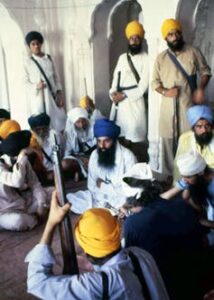 Moon Desk: The Sikh uprising in the 1980s was a violent encounter between the Indian armed police and militant young Sikhs, many of whom still harbored a yearning for a separate state in Punjab.
Moon Desk: The Sikh uprising in the 1980s was a violent encounter between the Indian armed police and militant young Sikhs, many of whom still harbored a yearning for a separate state in Punjab.
Thousands of lives were lost on both sides in violent encounters between the Sikh militants and security forces. The conflict came to a head in 1984 when Prime Minister Indira Gandhi launched Operation Blue Star to liberate the Sikh’s GoldenTemple from militants in the pilgrimage center of Amritsar and capture or kill the figurehead of the Khalistan movement, Sant Jarnail Singh Bhindranwale.
He was killed in the attack, and Sikhs around the world were incensed that their sacred place was violated by police action. Indira Gandhi was assassinated in retaliation by Sikh members of her own bodyguard.
In recent years, several firebrand Sikh activists in India have reasserted the idea of Khalistan, and the Indian government fears a return of the violence and militancy of the 1980s. The government of Narendra Modi wants to nip the movement in the bud before it gets too large and extreme.
After the Sikh uprising was crushed in the early 1990s, many Sikh activists fled India and went to Canada, where they were welcomed by a large Sikh community – many of whom had been sympathetic to the Khalistan idea. A sizable expatriate community of Sikhs has been growing in the country since the early 20th century, especially in British Columbia and Ontario.
Sikhs have been attracted to Canada not only because of its economic opportunities but also because of the freedom to develop their own ideas of Sikh community. Though support for Khalistan is illegal in India, in Canada Sikh activists are able to speak freely and organize for the cause.
Though Khalistan would be in India, the Canadian movement in favor of it helps to cement the diaspora Sikh identity and give the Canadian activists a sense of connection to the Indian homeland.
The diaspora community of Sikhs constitutes 2.1% of Canada’s population – a higher percentage of the total population than in India. They make up a significant voting block in the country and carry political clout. In fact, there are more Sikhs in Canada’s cabinet than in India’s.
Although Trudeau has assured the Indian government that any acts of violence will be punished, he also has reassured Canadians that he respects free speech and the rights of Sikhs to speak and organize freely as long as they do not violate Canadian laws.
The Bharata Janata Party, or BJP, of India’s Prime Minister Modi tends to support Hindu nationalism.
Recently, the Modi government used “Bharat” rather than “India” when referring to the country while hosting the G20 conference, attended by President Joe Biden, among other world dignitaries. “Bharat” is the preference of Hindu nationalists. This privileging, along with an increase in hate crimes, has led to an environment of fear and distrust among minorities, including Sikhs and Muslims, in India.
Considering the high percentage of Sikhs in Canada’s population, Trudeau understandably wants to assert the rights of Sikhs and show disapproval of the drift toward Hindu nationalism in India.
And this isn’t the only time that Trudeau and Modi have clashed over the issue. In 2018, Trudeau was condemned in India for his friendship with Jaspal Singh Atwal, a Khalistani supporter in Canada who was convicted of attempting to assassinate the chief minister of Punjab.





